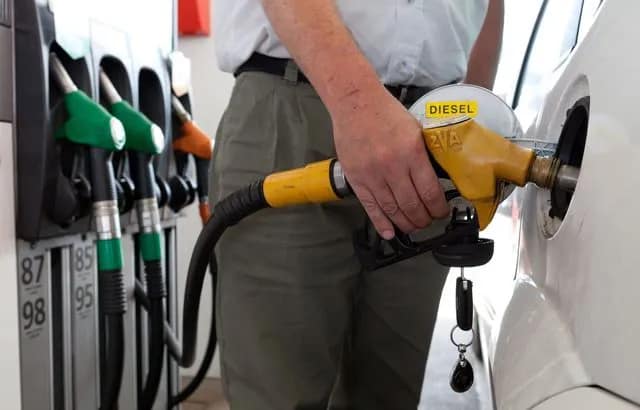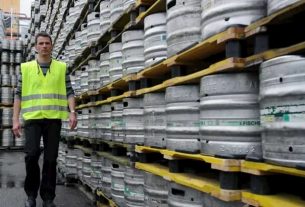SUPERPROFITS: TotalEnergies has decided not to increase fuel above 2 euros for the whole of 2023. Will other large companies follow suit?
-
On Wednesday, TotalEnergies announced that it would cap the price of petrol and diesel at 1.99 euros for the whole of 2023.
-
A decision which follows an appeal from Emmanuel Macron. The government continues to invite companies to “make efforts” to support the French. And on Tuesday, the Head of State had directly quoted TotalEnergies.
-
After this decision by the oil giant, will other large companies follow?
It was a long-awaited decision by the government. Due to inflation, the executive has indeed been asking for several months of efforts from large companies, in order to help the French in the battle for purchasing power. A wish long remained a dead letter. Until this Wednesday, and the decision of TotalEnergies. The group has announced that it will cap diesel and petrol at 1.99 euros until the end of 2023 in its French stations. This a response to yet another reminder from the Head of State, who on Tuesday declared his wish that “companies like Total” operate small rebates at the pump.
The choice to quote TotalEnergies was not trivial on the part of Emmanuel Macron. On !th February, two weeks before the president’s statement, the group announced that it had made 19.1 billion euros in profits in 2022, reigniting the debate on superprofits. Like the energy player, other groups display blazing health. CAC40 companies accumulated more than 100 billion euros in profits last year, according to a count by the French Press Agency, knowing that only 24 groups out of 40 have revealed their results. Will TotalEnergies’ gesture encourage other giants to cap certain prices, and have a snowball effect? From the Fnac shelves to Renault dealerships, will 2023 see plenty of products at maximum prices?
Total, a giant among giants
Nothing is less certain, warns Benjamin Coriat, a member of the Economists appalled. Two reasons to explain his scepticism. First, even on the CAC40 scale, TotalEnergies is posting very, very significant profits. It was number 1 of the French groups in 2021, also during the first half of 2022, and should, unless surprised, still be so throughout the year. Such a price cap requires “having strong backs. Total can easily afford it, not all”. Same observation with François Levêque, professor of economics at Mines-ParisTech: “Total is a special case, we cannot transpose its model to other companies. »
But above all, for the moment, “it’s an offer from Gascon”, reminds Benjamin Coriat (a false promise, for those who do not speak Gascon). Prices at the pump are currently well below 2 euros. Last week, for example, diesel sold on average at 1.8382 euros per litre, and unleaded 95-E10 at 1.8776 euros. “Of course, the future of gasoline prices cannot be predicted, and perhaps this measure will be used during the year 2023. But this is not a certainty. The trend is even rather bearish,” notes the economist.
Precedents without propagation
To trigger a snowball effect, we have seen more convincing. Especially since the act is not unprecedented. Several large French distribution companies have multiplied this type of initiative in recent months. At Carrefour, for example, the price of 100 essential products is blocked, between the 31st of December 2022 and the 31st May 2023. Leclerc, Carrefour always and Casino also chain “anti-inflation shields”, but this has not spread. beyond the world of supermarkets. And it wasn’t really a cap, but Total had also offered a rebate between September and December 2022, of 20 then 10 euro cents per litre. Again, the movement had not spread out of service stations.
Will Total do better this time? ? A bit of optimism from Sophie Schiller, professor of private law at Paris-Dauphine University, specializing in company law: “Of course, from the moment Total makes a move, other companies having made super-profits – even smaller ones – will find it difficult to explain that they cannot do so”.
What are the gains of doing this kind of manoeuvre?
And then, there’s no need to be naive: if Total does it, it’s not out of pure philanthropy, but out of self-interest. Beyond embellishing its image, “having a price advantage obviously allows you to win new customers. This is one of the basic principles of economics: the more products you sell, the more you can sell them at a low price”, analyzes François Levêque. For Benjamin Coriat, “if the measure is a success and Total comes out of it bigger, it could inspire other companies”.
An actor could not be in this wait-and-see attitude: the government, already decisive for this cap at 1.99 euros, recalls Sophie Schiller. “If Total does this, it is with a very political will to maintain the best possible relations with the executive. This will not change anything for foreign companies, but other French giants could make commercial gestures if the government strongly invites them to do so. It is important to get along well with the leaders of the country. It remains to be seen whether Emmanuel Macron will lecture other CAC40 giants.




